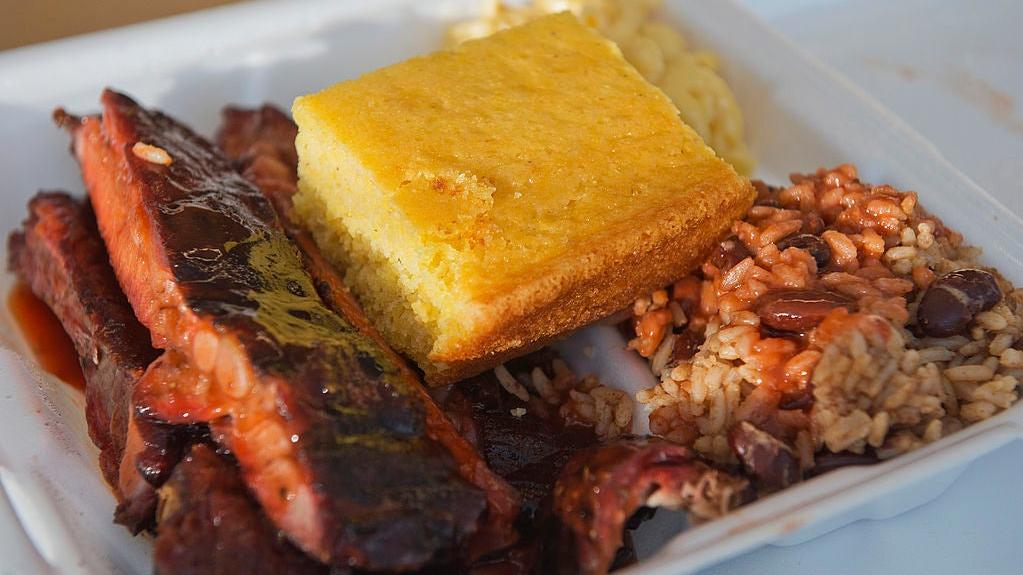Barbecue Traces An Unbroken Line Of Black Culinary History
Welcome to Flavor & Soul: A Brief History of African American Food. We'll be taking a closer look at one dish each week and tracing its roots within the African American cooking tradition.
I vividly remember the first time that I tasted barbecue ribs slathered with a tangy vinegar sauce. I was a kid in my grandmother's backyard and my great aunt had spent the morning grilling over a charcoal fire. The smoke swirled around me and enticed me with its thick, sweet aroma. I bit into the tender meat and the juicy, smoky flavor immediately won me over. I was never much of a meat eater but this bit of savory goodness was different. From then on, I looked forward to all the events that would call for barbecue: Memorial Day, July 4th, summer birthday parties, and family reunions.
I didn't realize it at the time, but celebrating with barbecued meat is a tradition that reaches back to the earliest days of African American history in this country, and Africa before that. Smoking, salting, and spicing meat was key to preserving it in the tropical West African climate, and festivals were often punctuated with the barbecue process. I never thought about the significance of this until Juneteenth celebrations started becoming popular outside of Texas.
Dating back to 1865, Juneteenth is the oldest nationally celebrated commemoration of the ending of slavery in the U.S. On June 19, 1865 in Galveston, Texas, Union soldiers delivered the news to the enslaved that the Civil War had ended and they were now free. This was a full two and half years after the Emancipation Proclamation had become official in 1863. The fact that these forebearers endured being brutalized and treated as inhuman for two long years longer than they had to is yet another crime to pile onto America's questionable history. But this is why we celebrate Juneteenth: to honor the strength and fortitude of our ancestors. The festivities typically include education or self-improvement presentations with speakers and panels, rodeos, baseball, and most significantly, barbecuing.
According to culinary historian and food writer Michael W. Twitty, enslaved men were the chief pit masters during colonial and antebellum times. Open pits covered with wood served as the focal point for techniques carried from Africa. Regional barbecue styles sprung up from the innovations that these cooks would make according to what kind of wood and ingredients were available. They laid the foundation for what would become a quintessential American food. Twitty emphasizes that the word barbecue can be traced to the West African Hausa people, who use the word babbake to describe grilling and cooking over a large fire. So it's no surprise that barbecue would be the centerpiece for Juneteenth celebrations. It represents an unbroken line of culinary memory and creativity.
The first time I saw an actual pit for barbecue was in Montego Bay, Jamaica. I had arrived at the popular open-air restaurant Skotchies, and the thick scent of spices guided me to the grilling area. Slender logs of pimento and sweet wood, which is the Jamaican name for the laurel, were laid out and covered with sheets of corrugated metal. Pieces of chicken and pork sizzled over the aromatic wood and the smell of scotch bonnet peppers, thyme, ginger, scallions, and allspice berries (the basic ingredients for jerk seasoning) made me drool.
The history of Jamaican jerk is similar to barbecue; the method was developed by Maroons, escaped enslaved Africans who lived in the mountains of Jamaica in independent communities that still exist today. They learned from indigenous Tainos, who had also fled the colonizers in the rough mountain terrain, how to cook meat in underground pits with smokeless embers so that their location would not be detected. So wherever African people landed in the Diaspora, the tradition of grilling meat over open pits and preserving it with spices followed.
I grew up within a distinctive barbecue culture on the South Side of Chicago, but I never knew this history. Now, even though I don't eat red meat anymore, whenever Juneteenth and cookout season rolls around, I admire the smoky delicacies for the living history that they have managed to uphold over centuries and across continents.
